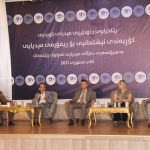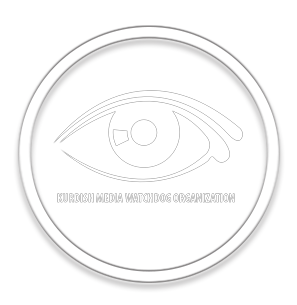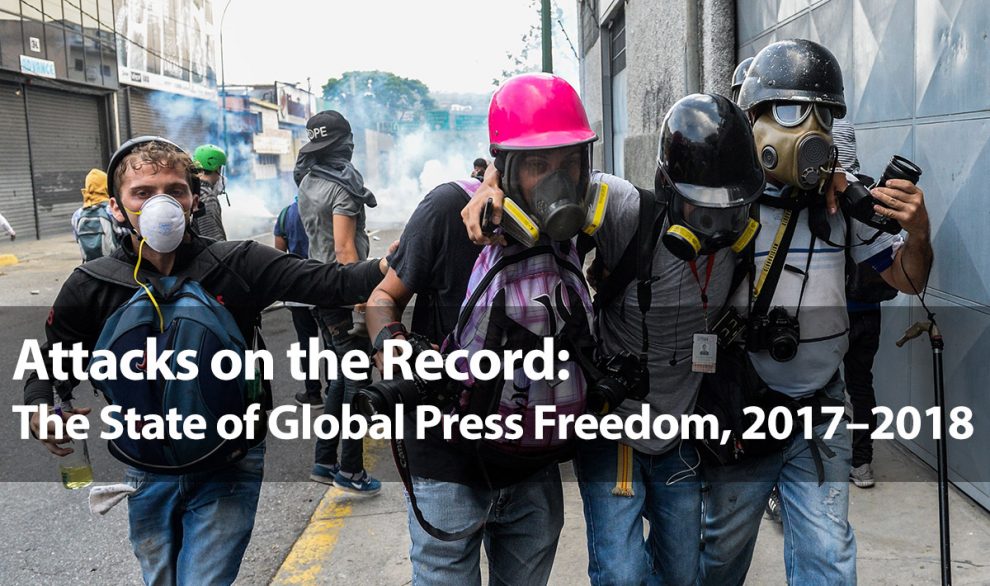Press freedom is facing new threats in major democracies as well as in repressive states, where authorities are focusing their efforts on social media and other online platforms after subduing the independence of major print and broadcast outlets. The analysis below—drawn from the findings of Freedom House’s most recent Freedom in the World, Freedom on the Net, and Nations in Transit research projects and from its in-country programs—shows that media independence is under pressure in every region of the world, but also that dedicated journalists are still playing a vital role in even the most hostile environments.
The Threat to Democracies
As recently as five years ago, global pressure on the media did not appear to affect the United States or the established democracies of Europe in any significant way. Today, populist leaders constitute a major threat to free expression in these open societies. Ambitious politicians around the world are increasingly willing to dispense with the norms of behavior that held their predecessors in check, in some cases blatantly undermining press freedom.
A press corps that calls out government failures is fundamental to the functioning of all democracies. But populist leaders are intentionally denouncing critical media and their coverage as biased, and the factual information they report as “fake,” weakening their credibility and leaving citizens unsure whom to believe. The leaders then have more leeway to dictate their own narrative and divert attention from corruption and other abuses. Moreover, by condemning the press as not only unfair but treasonous or criminal, antidemocratic politicians prepare the ground for attacks on other pillars of democracy, such as the judiciary.
For example, in Poland, the National Broadcasting Council fined leading station TVN24 the equivalent of $430,000 in December 2017 for “promoting illegal activities” through its reporting on antigovernment protests. The move sent a clear message that publicizing such dissent will not be tolerated, though the fine itself was annulled in January. In France, when a journalist outside a conference in May 2017 asked far-right presidential hopeful Marine Le Pen about her involvement in a parliamentary funds scandal, her private bodyguard pinned the journalist’s arms behind his back and hustled him out of the room, illustrating her party’s pattern of disdain for ordinary media scrutiny. In the United States, President Donald Trump has regularly disparaged individual journalists and news outlets when they challenge him or report factually on unwelcome developments.
The severity of the pressure differs from country to country, but the goal is always the same: Prevent the press from serving as a check on power. If the facts cannot be reported or the basic concept of truth is diluted, political leaders can do as they wish with no accountability for the results.
In Hungary, the ruling Fidesz party has gone a step further, consolidating control of private media outlets in the hands of government allies. The outlets continue to exist under their new owners, but both their independence and their critical nature are quashed. This hollowing of the press has been a key component of the party’s dismantling of Hungarian democracy.
The rise of democratically elected leaders who seek to cripple or co-opt the independent media has been compounded by external forces, most prominently the authoritarian government in Russia. As Moscow plants disinformation in the media environments of democratic countries, the public’s sense that the press is unreliable grows. Democratic governments have fumbled in their search for effective mechanisms to combat this threat.
Journalists in democracies continue to do their work, despite the sometimes harrowing new conditions. But if the free press, an essential component of democratic governance, is to survive as such, other elements of the democratic immune system must work to support it. These include opposition parties, an impartial judicial system, civil society organizations, and, most important, citizens—those who provide the revenue that keeps journalists in business and the votes that keep politicians in power.
Key Developments in 2017-2018
Americas
- U.S. president Donald Trump’s use of threatening rhetoric—including declarations that the media are “the enemy of the American people”—and his repeated disparagements of specific journalists and outlets have undermined public trust in fact-based journalism. At the same time, media organizations and independent journalists have maintained robust coverage of the administration and other topics of public interest, investigating potential abuses by powerful figures, publishing a range of commentary and analysis, and reporting in depth on the media’s own performance.
- In Venezuela, journalists faced brutal attempts to thwart their coverage of antigovernment protests. The new de facto legislature—stacked with government loyalists—passed a vague hate-speech law in November that mandates fines and up to 20 years’ imprisonment for anyone who disseminates information deemed “intolerant.”
- Ecuador’s new president, Lenín Moreno, has been refreshingly supportive of media independence, overseeing a relaxation of regulatory sanctions, preliminary steps to reform the onerous legal framework, and a less restrictive editorial line for government-controlled media. A number of problems persist, however, as indicated by the March 2018 kidnapping of three journalists.
Asia-Pacific
- Internet censorship and surveillance reached new heights in China as a Cybersecurity Law came into effect in June 2017, alongside other new regulations restricting online communications and the use of virtual private networks (VPNs). Numerous bloggers and social media users were arrested or sentenced to prison for critical online comments or efforts to share information about human rights.
- Press freedom in Cambodia suffered a crippling blow in late 2017 when the government closed the Cambodia Daily—one of the country’s last and most prominent independent media outlets—and 15 local radio stations, in addition to charging two Radio Free Asia journalists with espionage.
- In the Philippines, authorities moved to close Rappler, an online news outlet known for critical coverage of the government, on the grounds that it violated rules on foreign ownership. President Rodrigo Duterte defended the decision, which Rappler was contesting, and accused the site of attempting to undermine his administration.
Eurasia
- The Russian government took further steps to control the internet, adopting new legislation banning VPNs that can be used to circumvent censorship, a law requiring messaging applications and other online services to identify their users, a law barring foreign ownership of telecommunications services in Russia, and a new government strategy calling for all information infrastructure to be consolidated under state control by 2030. Separately, an investigative journalist was sentenced to 3.5 years in prison for “extremist” actions and attempting to overthrow the authorities.
- Georgia’s media landscape has been shaken by an ongoing dispute over the ownership of the opposition-oriented television outlet Rustavi 2, which has led to financial difficulties for the station; a more progovernment editorial policy at Georgia’s public broadcaster; and the extrajudicial abduction of an Azerbaijani journalist with the apparent assistance of Georgian security services.
- In Kyrgyzstan, the courts levied large fines against journalists and media outlets as a result of defamation suits filed on behalf of outgoing Kyrgyzstani president Almazbek Atambayev and his successor, Sooronbay Jeenbekov. In August 2017, a district court ordered the closure of Sentyabr TV, one of the few media outlets that was openly critical of the authorities.
Europe
- In Hungary, wealthy businesspeople associated with the ruling Fidesz party acquired most of the last bastions of independent journalism, including the leading online newspaper and all remaining regional newspapers. The purchases went forward without objections from the Hungarian Competition Authority or the Media Council.
- Turkey remained the world’s worst jailer of journalists, with 73 behind bars as of December, according to the Committee to Protect Journalists. The government permanently blocked Wikipedia in late April 2017, and 17 journalists from an opposition newspaper were tried on charges of aiding a terrorist organization.
- In Serbia, the newspaper Danas suffered a rapid cancelation of advertising contracts after it failed to support Aleksandar Vučić’s successful candidacy in the 2017 presidential election, while progovernment media were bolstered by front-page advertisements purchased by the ruling party.
Middle East and North Africa
- Since May 2017, Egyptian authorities have blocked hundreds of websites for allegedly “supporting terrorism,” including news sources, VPN sites, personal blogs, and the websites of nonprofit organizations.
- Israeli prime minister Benjamin Netanyahu, a fierce critic of journalists who challenge him, is under criminal investigation for alleged abuses including an offer to the publisher of a popular newspaper that he would limit circulation of a competing tabloid in exchange for more favorable coverage, and a scheme to grant regulatory favors to a telecommunications conglomerate in exchange for positive coverage on an affiliated news site.
- In Morocco, a number of citizen and online journalists were imprisoned during a crackdown on protests around the northern city of Al-Hoceima in the summer of 2017, and in August a court sentenced video blogger Mohamed Taghra to 10 months in jail on charges of criminal defamation for publishing a YouTube video on local police corruption.
- Saudi authorities blocked Qatari news sites in May 2017 and then demanded that Qatar shut down the television network Al–Jazeera and other Qatari-funded outlets, which have often been critical of Riyadh. Saudi crown prince Mohammad bin Salman oversaw a wave of arrests in September 2017 that were apparently aimed in part at suppressing dissent and asserting control over regional media assets.
Sub-Saharan Africa
- Tanzanian authorities banned or suspended four newspapers for political reasons, and new regulations published in March 2018 required official registration for online journalists and many social media users, empowered a state agency to restrict online content, and ordered surveillance of users in internet cafes.
- In response to growing protests in Anglophone regions of Cameroon, the government blocked messaging and social media applications and shut down internet service for 93 days in 2017. Security forces have harassed and intimidated journalists, and the National Communications Council imposed a ban on political reporting and programming.
- Conditions in The Gambia have improved steadily as the new administration of President Adama Barrow has welcomed exiled journalists back to the country and issued arrest warrants for suspects in the 2004 murder of journalist Deyda Hydara.
- Eight journalists and directors at Uganda’s Red Pepper newspaper were arrested, and the publication was briefly shut down in November 2017 as its editors stood trial for treason. A reporter for New Vision was abducted outside his office in February 2018, apparently as part of the government’s sustained effort to intimidate media critics.
The Power of Journalism
Even as journalists face harassment and arrest in a growing number of countries, their work can still expose egregious abuses, help victims find safety, and hold the corrupt and the dishonest to account. In dictatorships and democracies alike, courageous journalists have defied powerful interests to bring stories to the public, enabling their audiences to take action and bring about real change.
Slovakia: Exposing mafia links at the highest levels of government
Slovakian journalist Ján Kuciak and his fiancée were murdered by unknown assailants at the end of February 2018, but the impact of Kuciak’s work only grew. At the time of his death, Kuciak, who was already well known for his reporting on the Panama Papers, was investigating corruption in the administration of Prime Minister Robert Fico. His final story identified ties between members of the government and an Italian organized crime group. A draft of the report was published posthumously.
The circumstances of Kuciak’s murder added to long-standing public frustration with government corruption, leading to mass demonstrations. Tens of thousands of Slovakians joined the protests, the largest in the country since the 1989 Velvet Revolution. One of the organizers, Katarina Nagy Pazmany, said it was “unacceptable for a journalist to be murdered in a democratic country and the motive to be tied to his work.” Among organizers’ demands were a thorough investigation of Kuciak’s death and a “new trustworthy government.” Calls for Fico’s resignation became a centerpiece of the protests.
Two close associates of Fico who were implicated in Kuciak’s reporting resigned days after his murder. The minister of culture resigned to express shame that a journalist had been killed during his tenure. The interior minister, who was seen as a possible obstacle to a thorough investigation into Kuciak’s murder, also resigned. Finally, Fico capitulated and resigned less than two weeks later, though his party remained in power.
South Africa: Prompting a presidential resignation after a decade of corruption charges
South African president Jacob Zuma dodged charges of corruption for over a decade. In 2017, as his legal battles continued, the Gupta Leaks were published.
The Gupta brothers ran an extensive business operation that employed Zuma family members in high positions, and were accused of wielding enormous influence in Zuma’s administration. In May 2017, a group of investigative journalists published articles about corruption and state capture under Zuma based on a collection of leaked emails and other documents from inside the Gupta family’s business empire. The Gupta Leaks detailed corrupt connections between the Guptas and a range of government ministers and public companies. By late 2017, American and British authorities were investigating the use of banks in their countries for potentially illicit transactions involving the Gupta family and the South African government.
In the midst of the scandal, growing concerns about its impact on the economy, and signs that it could threaten his party’s hold on power, Zuma grudgingly stepped down as president in February 2018. He now faces prosecution on charges of fraud, racketeering, and money laundering that date back to the 1990s, before his presidency. Authorities have pursued the arrest of members of the Gupta family and continue to investigate possible corruption during Zuma’s tenure as president.
United States: Precipitating a cabinet resignation tied to misuse of funds
In the United States, the brevity of Tom Price’s tenure as head of the Department of Health and Human Services (HHS) can be traced to the work of Politico journalists Dan Diamond and Rachana Pradhan. In September 2017, the pair published stories detailing Price’s extensive use of charter flights, bringing his total travel costs to over $1 million in less than six months.
In a departure from the practice of previous cabinet secretaries, Price’s office revealed few details about his schedule. It was only after months of Diamond and Pradhan’s dogged reporting, which included cultivating confidential sources and staking out airports, that Price’s expensive travel habits were exposed. Without this extensive journalistic undertaking, the expenditures may have gone unnoticed.
Price resigned, and a congressional committee opened an investigation into his use of private aircraft. Six months later, the effects of Diamond and Pradhan’s reporting continued to be felt. John Bardis, the HHS official who approved Price’s use of charter flights and the focus of ongoing inquiries, announced his own resignation in March.
Russia: Illuminating state-sanctioned terror against gay men
In April 2017, reporter Yelena Milashina alerted the world to a violent purge of men suspected of being gay in the Russian republic of Chechnya. Novaya Gazeta, an independent Russian newspaper known for investigative reporting, published her findings about the state-sanctioned campaign of illegal detention, torture, and murder being carried out by the Chechen police. Milashina and her sources took on great risks by pursuing the story; six of her fellow Novaya Gazeta reporters have been killed over the years, including renowned journalist Anna Politkovskaya.
Milashina had to publish enough information to provide a credible account, but not reveal so much that any of her sources would be identified and face retribution. She received death threats in response to her reporting and, fearing for her safety, temporarily left Russia shortly after publishing the story.
Although it put her own well-being at risk, Milashina’s reporting saved lives. Since her work was published, scores of vulnerable men and women have received assistance in fleeing Chechnya; countries including Canada, France, Germany, Lithuania, and the Netherlands have accepted the refugees. However, many other countries chose not to help persecuted Chechens, and some individuals who gained asylum found that leaving Chechnya did not guarantee their safety. Building on Milashina’s efforts, other journalists have discovered that Chechen refugees in Western Europe are subject to attacks by fellow Chechen immigrants and cross-border harassment by the Chechen authorities.
Countries to Watch
The following countries may experience important media freedom developments in the coming year and deserve special scrutiny:
- Despite Raúl Castro’s retirement from the presidency, the regime in Cuba may increase its repression of independent journalism to dampen criticism and maintain the status quo.
- Iran’s media environment has shown modest improvement in recent years, with fewer journalists in jail, but crackdowns and online censorship related to the protests that began in late December 2017 raised new doubts about the regime’s future direction.
- Journalists in Mexico, already one of the world’s deadliest environments for the press, risk encountering more violence as the country prepares for July 2018 general elections. The vote will serve as a referendum on an administration that has become increasingly hostile toward independent media.
- Poland’s ruling party has moved to exert control over the press and could curtail foreign ownership in a bid to silence more independent voices.
- Convictions under Spain’s broadly written antiterrorism law are increasing, targeting a variety of individuals for controversial speech and raising concerns about self-censorship in this otherwise democratic country.
- Tunisia, the sole success story from the 2011 Arab Spring, suffered a decline in press freedom as the government censored sensitive information and allegedly intimidated journalists. The struggling democracy could yet recover its earlier gains following the establishment in 2017 of an independent Press Council.
- The new government in Uzbekistan has taken encouraging steps toward greater openness, but a true departure from harsh authoritarian rule will be possible only if the media are granted editorial independence and free rein to report on abuses.
- Physical attacks on and intimidation of journalists by both ruling party and opposition forces are increasing in Zambia, and the minister of higher education has admitted to monitoring students’ online conversations, boding ill for free and open discussion on the internet.
Source: Freedom House











